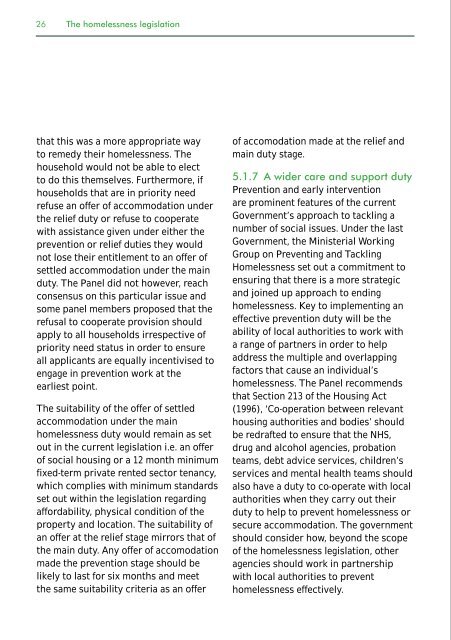The homelessness legislation
The%20homelessness%20legislation,%20an%20independent%20review%20of%20the%20legal%20duties%20owed%20to%20homeless%20people
The%20homelessness%20legislation,%20an%20independent%20review%20of%20the%20legal%20duties%20owed%20to%20homeless%20people
You also want an ePaper? Increase the reach of your titles
YUMPU automatically turns print PDFs into web optimized ePapers that Google loves.
26 <strong>The</strong> <strong>homelessness</strong> <strong>legislation</strong> 27<br />
that this was a more appropriate way<br />
to remedy their <strong>homelessness</strong>. <strong>The</strong><br />
household would not be able to elect<br />
to do this themselves. Furthermore, if<br />
households that are in priority need<br />
refuse an offer of accommodation under<br />
the relief duty or refuse to cooperate<br />
with assistance given under either the<br />
prevention or relief duties they would<br />
not lose their entitlement to an offer of<br />
settled accommodation under the main<br />
duty. <strong>The</strong> Panel did not however, reach<br />
consensus on this particular issue and<br />
some panel members proposed that the<br />
refusal to cooperate provision should<br />
apply to all households irrespective of<br />
priority need status in order to ensure<br />
all applicants are equally incentivised to<br />
engage in prevention work at the<br />
earliest point.<br />
<strong>The</strong> suitability of the offer of settled<br />
accommodation under the main<br />
<strong>homelessness</strong> duty would remain as set<br />
out in the current <strong>legislation</strong> i.e. an offer<br />
of social housing or a 12 month minimum<br />
fixed-term private rented sector tenancy,<br />
which complies with minimum standards<br />
set out within the <strong>legislation</strong> regarding<br />
affordability, physical condition of the<br />
property and location. <strong>The</strong> suitability of<br />
an offer at the relief stage mirrors that of<br />
the main duty. Any offer of accomodation<br />
made the prevention stage should be<br />
likely to last for six months and meet<br />
the same suitability criteria as an offer<br />
of accomodation made at the relief and<br />
main duty stage.<br />
5.1.7 A wider care and support duty<br />
Prevention and early intervention<br />
are prominent features of the current<br />
Government’s approach to tackling a<br />
number of social issues. Under the last<br />
Government, the Ministerial Working<br />
Group on Preventing and Tackling<br />
Homelessness set out a commitment to<br />
ensuring that there is a more strategic<br />
and joined up approach to ending<br />
<strong>homelessness</strong>. Key to implementing an<br />
effective prevention duty will be the<br />
ability of local authorities to work with<br />
a range of partners in order to help<br />
address the multiple and overlapping<br />
factors that cause an individual’s<br />
<strong>homelessness</strong>. <strong>The</strong> Panel recommends<br />
that Section 213 of the Housing Act<br />
(1996), ‘Co-operation between relevant<br />
housing authorities and bodies’ should<br />
be redrafted to ensure that the NHS,<br />
drug and alcohol agencies, probation<br />
teams, debt advice services, children’s<br />
services and mental health teams should<br />
also have a duty to co-operate with local<br />
authorities when they carry out their<br />
duty to help to prevent <strong>homelessness</strong> or<br />
secure accommodation. <strong>The</strong> government<br />
should consider how, beyond the scope<br />
of the <strong>homelessness</strong> <strong>legislation</strong>, other<br />
agencies should work in partnership<br />
with local authorities to prevent<br />
<strong>homelessness</strong> effectively.<br />
5.2 Broader issues to<br />
be considered<br />
During the panel’s discussions about<br />
the need for reform of the current<br />
<strong>homelessness</strong> <strong>legislation</strong>, a number<br />
of associated concerns were raised<br />
which sat outside the scope of our<br />
current exercise, yet warrant inclusion<br />
here as possible avenues for future<br />
consideration if the government adopts<br />
this alternative legal framework.<br />
5.2.1 Enforcement<br />
<strong>The</strong> current mechanisms for enforcing<br />
the <strong>homelessness</strong> <strong>legislation</strong> are<br />
relatively weak. <strong>The</strong>re is no regulator<br />
of local authorities’ housing and<br />
<strong>homelessness</strong> services, which makes<br />
it very difficult to ensure that, beyond<br />
individual recourse to the law, the<br />
<strong>legislation</strong> is working as intended.<br />
<strong>The</strong> Panel have recommended that<br />
Section 202 of the Housing Act (1996)<br />
‘Right to request review of decision’<br />
is amended to reflect the nature of<br />
the review in relation to the new duty<br />
to assess, duty to help to prevent<br />
<strong>homelessness</strong> and the duty to help<br />
to secure accommodation. <strong>The</strong>re<br />
will not usually be a ‘decision’ to be<br />
reviewed (unless a specific offer of<br />
accommodation has been made and<br />
there is a challenge to its suitability), but<br />
the Panel’s recommended review will be<br />
in respect of the process of assessment<br />
and assistance, including the adequacy<br />
of any assistance and the outcome.<br />
This has the benefit of ensuring that<br />
applicants can challenge the process as<br />
well as the outcome.<br />
In order to monitor the overall<br />
effectiveness of the new <strong>legislation</strong>,<br />
the government should require robust<br />
data collection from local authorities<br />
on the new prevention and relief duties.<br />
Following an investigation in 2015,<br />
the UK Statistics Authority published<br />
a report, which made a series of<br />
recommendations on how the collection<br />
and publication of the <strong>homelessness</strong><br />
statistics could be improved. 33 <strong>The</strong><br />
report concluded that given the growing<br />
importance of prevention and relief<br />
activity the government should look at<br />
how these statistics might be improved<br />
to the same standard as the statutory<br />
<strong>homelessness</strong> statistics with regards<br />
to the level of detail collected and the<br />
frequency of publication.<br />
<strong>The</strong> Panel therefore recommends that<br />
the data should include information<br />
on the types of households that are<br />
assisted, the action taken and the<br />
long-term outcomes of that assistance.<br />
33. UK Statistics Authority (2015), Statistics on Homelessness and Rough Sleeping in England, London: UK<br />
Statistics Authority


